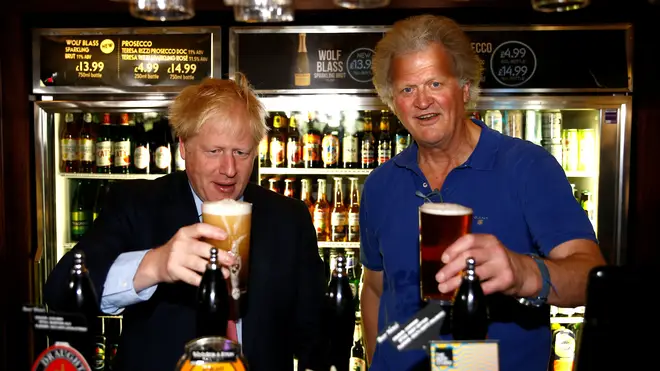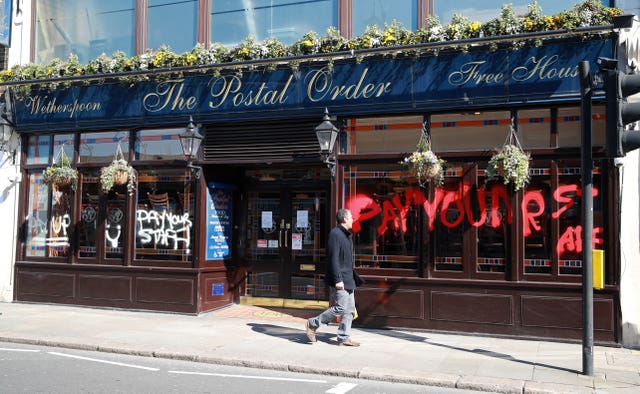
Richard Spurr 1am - 4am
16 October 2020, 08:54

The pub chain said the 10pm curfew, enforced table service and other restrictions continue to hold back sales.
Pubs chain JD Wetherspoon has sunk to a loss of £105.4 million after sales took a £556 million hit from the Covid-19 crisis.
The company said it saw an increase in business in the weeks following the easing of lockdown but the new restrictions and 10pm curfew have seen this fall back.
One-off costs due to Covid-19 hit £29 million, including £5.9 million in drinks and food that had to be thrown away, £6.2 million on PPE, screens and other equipment to make pubs Covid- secure, and £17.1 million on staff costs.
However, the company benefited from a £15.9 million payout from HMRC over a long-term gaming machine dispute.

The loss is the first time founder and chairman Tim Martin’s chain has sunk into the red since 1984 but the company remains confident that it can continue to trade.
No details were provided on potential or recent job losses but two pubs were opened and nine were sold or closed.
Mr Martin instead attacked politicians and the media who reported that the company was considering withholding wages at the start of lockdown in March – a decision that was eventually not taken, with workers paid throughout.
Outbreaks of the virus among employees were limited, the company said, with only one instance where local authority health officials found insufficient social distancing in staff-only areas, which “probably resulted in four staff members testing positive”.
But there have been no cases reported to the chain of a transfer of the virus between customers or staff in public areas, it added.
In terms of sales, Wetherspoon revealed that sales in the year to July 26 fell from £1.82 billion to £1.26 billion, with a loss of £105.4 million. In 2019, under slightly different accounting rules, the company made a pre-tax profit of £95.4 million.
In the 11 weeks since, sales have been 15% below those of last year, with strong sales in the first few weeks, followed by a marked slowdown since the introduction of a curfew and other regulations.
The company added that approximately 46 million customers have visited Wetherspoon pubs since July 4.
Mr Martin said table service has been particularly costly to the chain and renewed calls on the Government to change regulations which continue to favour supermarkets.
He said: “It makes no sense for supermarkets to be treated more leniently than pubs, since pubs generate far more jobs per pint or meal than do supermarkets, as well as far higher levels of tax.
“Pubs also make an important contribution to the social life of many communities and have better visibility and control of those who consume alcoholic drinks.”

In a long rant to the London Stock Exchange, Mr Martin said the pubs sector has been unfairly targeted with restrictions, pointing out only one pub has seen a Covid-19 outbreak, and retraining for staff taking place immediately.
He also reiterated his belief that 100 governments around the world were wrong to follow scientific advice and impose restrictions, instead telling shareholders the UK should follow the Swedish model of lighter restrictions.
Quoting business scion Warren Buffett from 1989, he claimed Swedish Professor Johan Giesecke is the epidemiologist equivalent and the UK should follow his lead, which would allow Wetherspoon to reopen pubs.
Mr Martin, who has no medical qualifications, also questioned the science of wearing face masks.
“The most damaging regulation relates to the 10pm curfew, which has few supporters outside of the narrow cloisters of Downing Street and Sage meetings,” he said.
“This has meant that many thousands of hospitality industry employees, striving to maintain hygiene and social-distancing standards, go off duty at 10pm, leaving people to socialise in homes and at private events which are, in reality, impossible to regulate.
“In marked contrast to the consistency of the comparatively successful Swedish approach, which emphasises social distancing, hygiene and trust in the people, the erratic UK Government is jumping from pillar to post and is both tightening and tinkering with regulations, so we are now in quasi-lockdown which is producing visibly worse outcomes than those in Sweden, in respect of both health and the economy.
“Risk cannot be eliminated completely in pubs, but sensible social-distancing and hygiene policies, combined with continued assistance and co-operation from the authorities, should minimise it.”